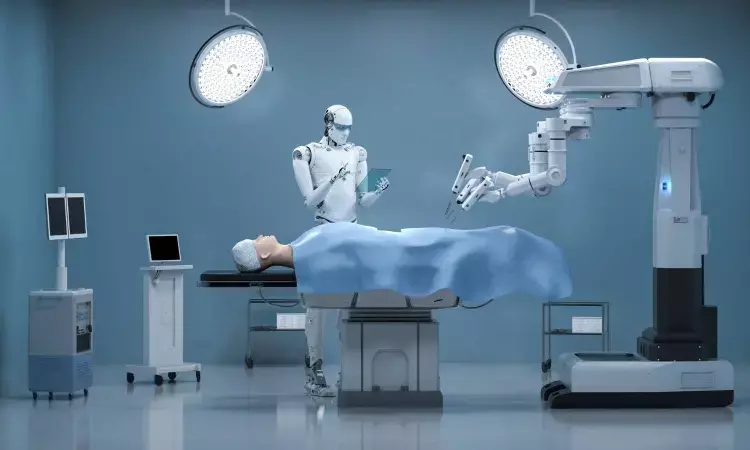- Home
- Medical news & Guidelines
- Anesthesiology
- Cardiology and CTVS
- Critical Care
- Dentistry
- Dermatology
- Diabetes and Endocrinology
- ENT
- Gastroenterology
- Medicine
- Nephrology
- Neurology
- Obstretics-Gynaecology
- Oncology
- Ophthalmology
- Orthopaedics
- Pediatrics-Neonatology
- Psychiatry
- Pulmonology
- Radiology
- Surgery
- Urology
- Laboratory Medicine
- Diet
- Nursing
- Paramedical
- Physiotherapy
- Health news
- Fact Check
- Bone Health Fact Check
- Brain Health Fact Check
- Cancer Related Fact Check
- Child Care Fact Check
- Dental and oral health fact check
- Diabetes and metabolic health fact check
- Diet and Nutrition Fact Check
- Eye and ENT Care Fact Check
- Fitness fact check
- Gut health fact check
- Heart health fact check
- Kidney health fact check
- Medical education fact check
- Men's health fact check
- Respiratory fact check
- Skin and hair care fact check
- Vaccine and Immunization fact check
- Women's health fact check
- AYUSH
- State News
- Andaman and Nicobar Islands
- Andhra Pradesh
- Arunachal Pradesh
- Assam
- Bihar
- Chandigarh
- Chattisgarh
- Dadra and Nagar Haveli
- Daman and Diu
- Delhi
- Goa
- Gujarat
- Haryana
- Himachal Pradesh
- Jammu & Kashmir
- Jharkhand
- Karnataka
- Kerala
- Ladakh
- Lakshadweep
- Madhya Pradesh
- Maharashtra
- Manipur
- Meghalaya
- Mizoram
- Nagaland
- Odisha
- Puducherry
- Punjab
- Rajasthan
- Sikkim
- Tamil Nadu
- Telangana
- Tripura
- Uttar Pradesh
- Uttrakhand
- West Bengal
- Medical Education
- Industry
Robotic Surgery Boosts outcomes of Colorectal Cancer

In the evolving landscape of colorectal cancer (CRC) surgery, a recent retrospective cohort study underscores the growing preference for robotic procedures over conventional laparoscopy. The study concludes that robotic surgery for CRC offers clear advantages, particularly in right and left colectomies, by significantly improving textbook outcomes. This study was published in the World Journal Of Surgical Oncology by Emile Farah and colleagues.
Utilizing a national cohort of patients from the ACS-NSQIP database (2015–2020), the study aims to compare outcomes between robotic and laparoscopic approaches for colorectal cancer. Among 139,759 screened patients, 53,209 were included in the study, focusing on colorectal procedures for malignant etiologies, including right colectomy (RC), left colectomy (LC), and low anterior resection (LAR).
Matching and Outcomes:
Optimal pair matching, with a standardized mean difference of 0.048, was performed, comparing laparoscopic and robotic surgery outcomes.
"Textbook outcome" (absence of 30-day complications, readmission, or mortality, and length of stay < 5 days) was significantly higher with robotic surgery in RC and LC but not in LAR (71% vs. 64% in RC, 75% vs. 68% in LC; p < 0.001).
Complications and Conversion Rates:
Robotic LAR showed an increased risk of major morbidity (7.1% vs. 5.8%; p = 0.012).
Across all procedures, the mean conversion rate for robotic surgery was lower than laparoscopy (4.3% vs. 9.2%; p < 0.001).
Robotic surgery had a longer mean operative time compared to laparoscopy (225 min vs. 177 min; p < 0.001).
However, these advantages were not observed in robotic low anterior resection, which exhibited an increased risk of serious complications. Notably, robotic procedures showed a lower conversion rate but required more operative time compared to laparoscopy. The associations identified in the study contribute valuable insights to the ongoing discussion on the surgical management of colorectal cancer patients. Surgeons and healthcare professionals should weigh the benefits and potential risks associated with robotic surgery, especially when considering the specific procedure involved.
Reference:
Farah, E., Abreu, A. A., Rail, B., Salgado, J., Karagkounis, G., Zeh, H. J., III, & Polanco, P. M. Perioperative outcomes of robotic and laparoscopic surgery for colorectal cancer: a propensity score-matched analysis. World Journal of Surgical Oncology,2023;21(1). https://doi.org/10.1186/s12957-023-03138-y
Dr Riya Dave has completed dentistry from Gujarat University in 2022. She is a dentist and accomplished medical and scientific writer known for her commitment to bridging the gap between clinical expertise and accessible healthcare information. She has been actively involved in writing blogs related to health and wellness.
Dr Kamal Kant Kohli-MBBS, DTCD- a chest specialist with more than 30 years of practice and a flair for writing clinical articles, Dr Kamal Kant Kohli joined Medical Dialogues as a Chief Editor of Medical News. Besides writing articles, as an editor, he proofreads and verifies all the medical content published on Medical Dialogues including those coming from journals, studies,medical conferences,guidelines etc. Email: drkohli@medicaldialogues.in. Contact no. 011-43720751


